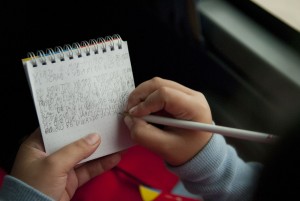 To observers in some foreign lands, the ban on audio and video recordings being made in British courts must seem like an affront to open justice. What is undoubtedly more bizarre is the position on note-taking by people in the public gallery. Although there is no statutory provision on this, there has long been a belief that members of the public are either banned from taking notes, or have to ask the judge’s permission before doing so. People have been castigated or even threatened with ‘contempt in the face of the court’ (a particularly serious form of contempt) for daring to take notes during a trial. Bona fide journalists seem to get better treatment.
To observers in some foreign lands, the ban on audio and video recordings being made in British courts must seem like an affront to open justice. What is undoubtedly more bizarre is the position on note-taking by people in the public gallery. Although there is no statutory provision on this, there has long been a belief that members of the public are either banned from taking notes, or have to ask the judge’s permission before doing so. People have been castigated or even threatened with ‘contempt in the face of the court’ (a particularly serious form of contempt) for daring to take notes during a trial. Bona fide journalists seem to get better treatment.
This belief has made its way into important textbooks. For example, Gillespie had this to say to students thinking about visiting a court (from The English Legal System, 4th ed):
You cannot write or draw in a courtroom without the judge’s permission. If you are visiting a court because you want to see a particular case because you think it will help your studies (e.g. you are writing a dissertation) then you may be able to get permission. In advance of the case being heard you should ring up the court and ask for the name of the judge presiding over that case. You should then write to him or her (with the salutation being “Dear Judge” regardless of their judicial rank) explain why you want to make notes and ask for permission to make notes. They may say ‘yes’ although they may ask to see the notes. If they say ‘no’ then do not ignore this as it could lead to you being found in contempt of court.
HMCTS, however, is unequivocal: it advises court staff that there ‘can be no objection to note taking in the public gallery unless it is done for a wrongful purpose’. It advises staff that they should report suspicions of an ‘improper purpose’ to the judge, but normally should not prohibit note-taking. An improper purpose might be to pass information to future witnesses in a criminal trial so that they can tailor their evidence to what has already been said.
The received wisdom in Gillespie was almost certainly wrong when it was published in 2011, and has been confirmed to be so in the recent case of Ewing v. Crown Court [2016] EWHC 183 (Admin). The judgment observes that
a practice of requiring permission to be sought to make notes has developed [in the Cardiff Crown Court]
but criticises this approach, concluding that
[i]t is a feature of the principle of open justice that those attending public hearings should ordinarily be able to make notes of what occurs. For any number of reasons a visitor to a court may wish to have a record of the proceedings for later use or out of interest. In this jurisdiction there is no good reason why the starting point should be that note-taking is not allowed unless permission has been sought and granted. Note-taking by members of the public is unlikely, without more, to interfere with the due administration of justice. The reasons for a distinction being drawn between ordinary members of the public and journalists and legal commentators … do not apply to ordinary note-taking.
So that settles it: in England and Wales, you can take notes in court without asking for permission, and for any (or no particular) reason. No-one—not even the judge—should stop you unless you’re doing something really naughty.
But don’t think that you can use the same argument for recording everything on your phone. Unlike note-taking there is a specific rule making this illegal, and the court can take your phone away and put you in prison. Don’t do it kids!

Leave a Reply